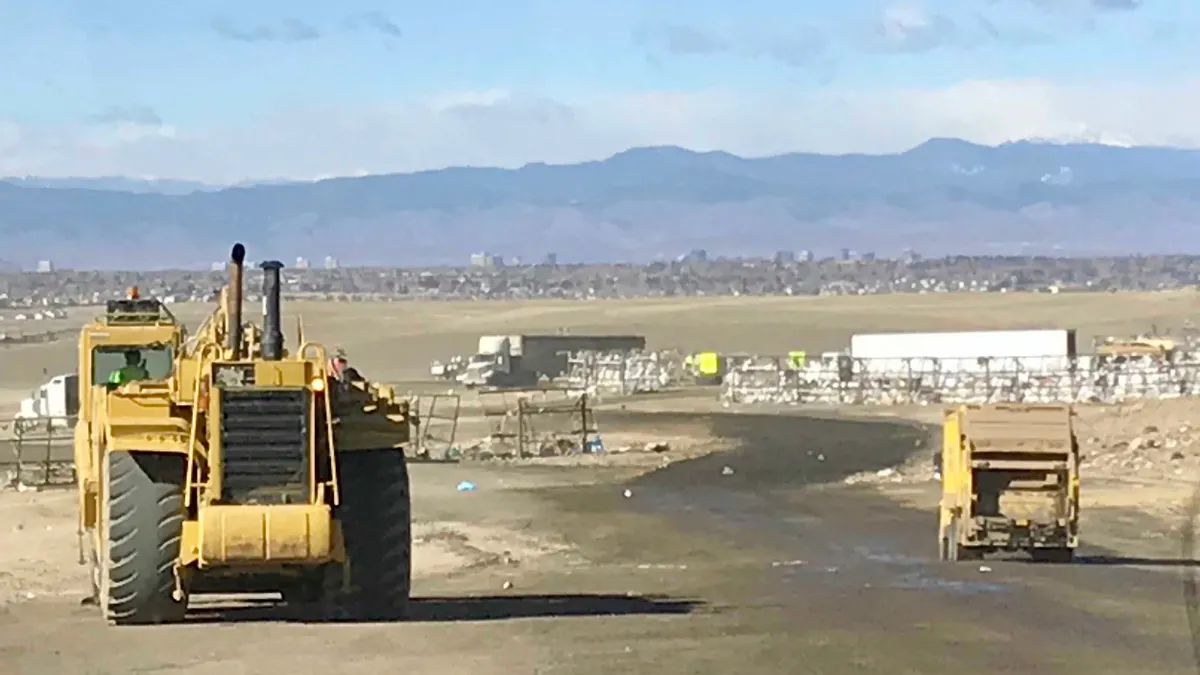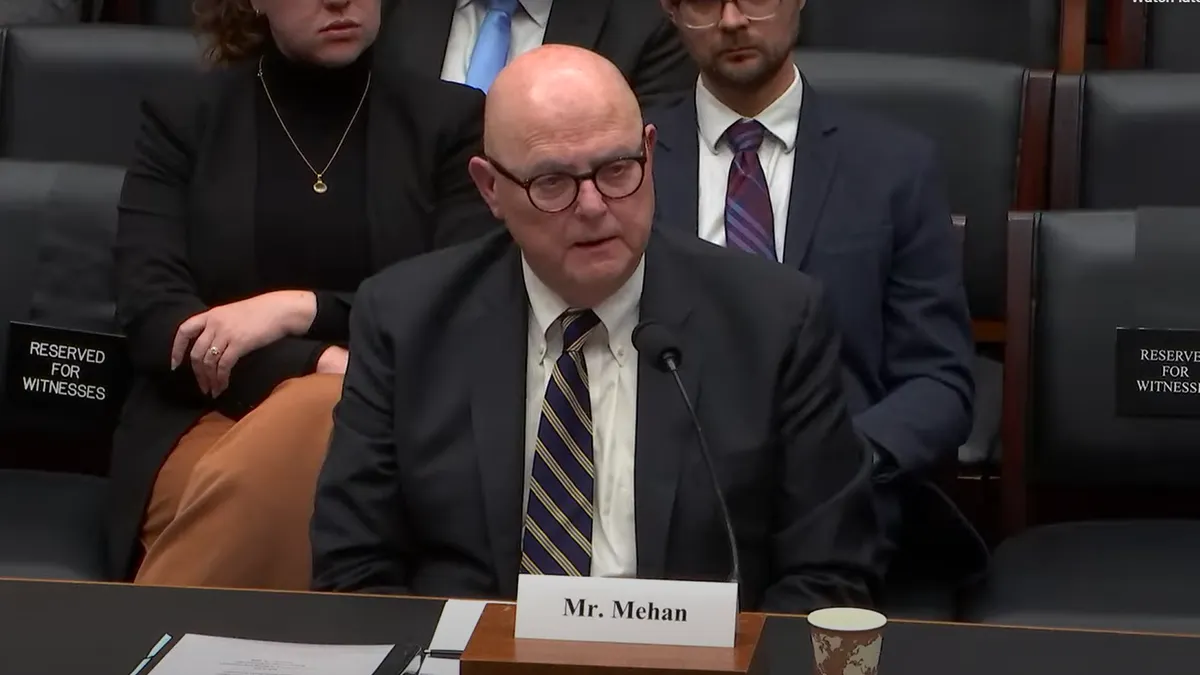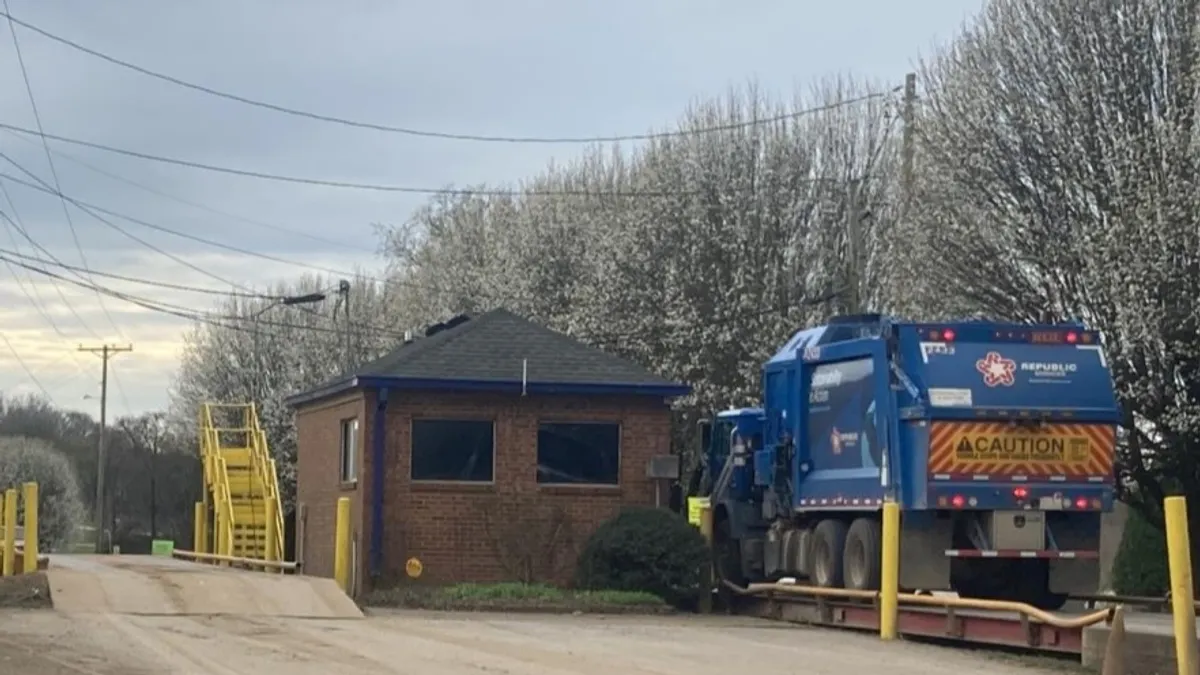Covanta is committing to setting a "science-based greenhouse gas reduction target" by 2022, part of a wider-scale acknowledgement of shareholder concerns about climate change.
In the company's fifth-ever sustainability report, Covanta laid out the pledge along with other environmental and sustainability goals. Throughout the report, Covanta emphasizes the role incineration plays in diverting waste from landfills, a leading source of methane. That greenhouse gas is 80 times more potent than carbon over an initial 20-year span. Covanta is seeking to match recycling and energy recovery rates in Europe, which the report argues will reduce greenhouse gas emissions by 1 billion metric tons of carbon equivalents by mid-century.
Michael Van Brunt, senior director of sustainability for Covanta, told Waste Dive the company is using the Paris Agreement's oft-cited temperature thresholds — keeping global warming from rising more than 2°C above pre-industrial temperatures, while aiming for below 1.5°C — as a model.
"Science-based targets sets a framework around what we're trying to achieve," he said.
It is unclear how exactly Covanta plans to lay out the framework for meeting its goals, but it is one of a growing number of waste companies acknowledging the implications of climate change. The report is published as part of the Global Reporting Initiative (GRI), an independent organization that encourages companies to identify and report on the environmental, economic and social impacts associated with their operations.
Other points of emphasis in the report include health among the company's workforce — with a 31% reduction in safety incidents year-over-year — along with engagement, community relations and materials management. But climate and environmental goals stand out in the 128-page document.
The company's new sustainability reporting nods to the ways in which rising temperatures and unstable weather patterns are already affecting operations. That includes U.S. facilities "located on estuaries that could become affected by storm surge" and "numerous inland facilities" vulnerable to hurricanes and other major weather events.
Covanta argues the company is in a somewhat unique position to push climate goals forward. While waste-to-energy remains a source of controversy for health and environmental groups due to pollution and other byproducts, WTE advocates see it as a critical alternative to landfilling. According to the U.S. EPA, MSW landfills are the third-largest source of human-generated methane emissions in the United States.
Covanta reports its own emissions under EPA's GHG Reporting Program. In the company's 2018 filing, which covers 2017, Covanta reported a 10% reduction in indirect emissions from the prior year excluding those associated with the generation of purchased energy. In 2011, the latest date for which the company reported direct emissions, Covanta said it produced 3,955,726 metric tons of carbon emissions. That number was up to 3,996,871 by a later unspecified date.
"We're able to divert organic material out of landfills," Van Brunt said, arguing Covanta is "incredibly well-positioned as being part of the solution today."
Governments, companies, and other stakeholders are increasingly using timeframes to set their climate targets, often homing in on 2050 as a deadline, or the more ambitious 2030 date. Those dates stem from scientific findings, as do the Paris Agreement's thresholds around limiting warming through temperature goals. But Van Brunt said Covanta will be focusing on the latter measurement as the company looks to a largely post-landfill future.
"Once we get to being a Germany or an Austria...what do you do then? What are some of things we can do as a [waste-to-energy] company to help reduce greenhouse emissions even further?" he queried.
But pushback from critics is likely. When asked for comment on Covanta's sustainability aspirations, the Sierra Club directed Waste Dive to 2018 public comments from the group on proposed permits for a Covanta facility in Virginia. Those comments reflect wider concerns environmental groups hold about waste incineration's emissions and contributions to air pollution, even as they nod to the improvements made with new technologies and safety standards. Still, some of their broader concerns about methane echo Covanta's own refrains about the downside of landfilling.
"The dangers of methane are well documented and the longer we fail to take the steps necessary to restrict it from all sources, we will continue to accelerate the climate crisis," said John Coequyt, Sierra Club's senior director for federal and international campaigns, in a statement to Waste Dive.
Covanta's new report argues its facilities are "subject to stringent regulatory standards" and highlights environmental justice as a priority.
"We know we have facilities that are [in areas] identified as environmental justice communities," Van Brunt said, acknowledging the disproportionate impact the company's processes have on vulnerable nearby residents. "It's part of our responsibility [as members of those communities] to focus our emissions reductions in those areas."
He pointed to a facility in Newark, New Jersey as an example of Covanta's environmental justice projects. That site, Van Brunt said, added a $90 million baghouse in 2016, reducing lead emissions by 90% and mercury emissions by 80%. While Newark residents continue to protest the facility, figures like Sen. Cory Booker have expressed support for the changes.
Despite pushback over environmental issues, Covanta's new sustainability efforts are likely to stand out given the rapidly-approaching 2022 deadline for setting climate targets. Van Brunt indicated his hopes that the company's goals might encourages others to follow suit.
The report comes as other companies are also seeking to distinguish themselves on climate action. Republic Services is similarly aiming "to keep global temperature increase well-below 2 degrees Celsius compared to pre-industrial temperatures." North America's second-largest waste company has set 2030 greenhouse gas reductions targets approved by the Science Based Targets initiative (SBTi). Waste Management is meanwhile aiming for "moonshot" emissions reduction targets by 2038.

















